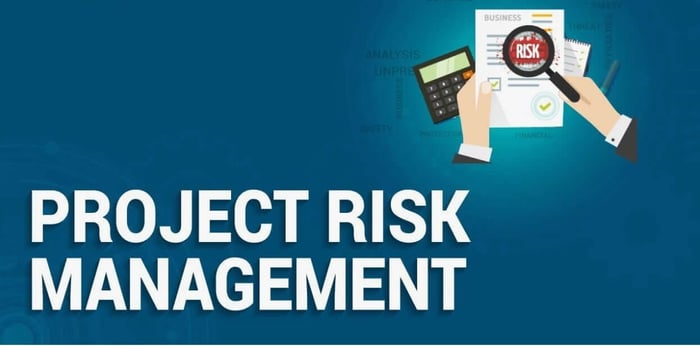Table of Contents
- 🎉 Risk Management Doesn't Have to Be Risky Business!
- 📌 What is the Certified Project Risk Manager (CPRM) Certification?
- 📊 CPRM vs. Other Project Management Certifications
- 🧩 Key Components of the CPRM Curriculum
- 🔍 Who Should Get the CPRM Certification?
- 🌎 Global Recognition of CPRM: Country-Wise Accreditation Guide
- 📈 Job Roles and Salaries After CPRM Certification
- 🧠 10 Lesser-Known Facts About Project Risk Management
- 💡 Pro Tips for Aspiring CPRMs
- 🎯 Final Thoughts: Elevate Your Career with APMIC
- FAQs
🎉 Risk Management Doesn't Have to Be Risky Business!
Ever felt like managing project risks is akin to juggling flaming swords while riding a unicycle? 🎪🔥 Well, fear not! The Certified Project Risk Manager (CPRM) Certification is here to turn that chaotic circus into a well-orchestrated performance. Let's dive into the world of CPRM and discover how it can transform your project management career.
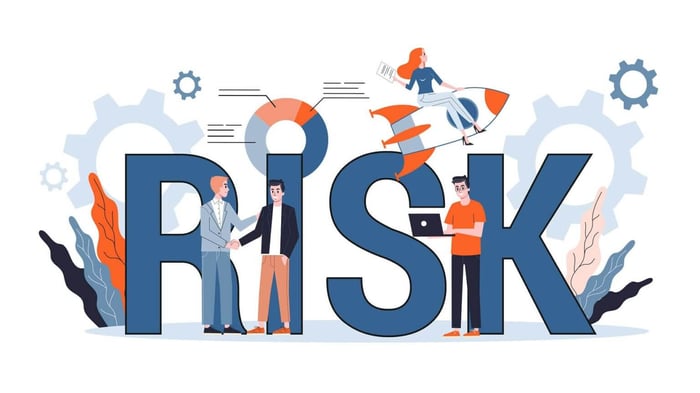
📌 What is the Certified Project Risk Manager (CPRM) Certification?
The Certified Project Risk Manager (CPRM) Certification is a specialized credential designed for professionals who aim to master the art of identifying, analyzing, and mitigating risks in projects. This certification equips you with the tools and techniques to proactively manage uncertainties and ensure project success.
If you're leaning toward Agile roles, consider exploring the Scrum Master guide to understand how it compares with risk-focused certifications like CPRM.
🧠 Why Pursue the CPRM Certification?
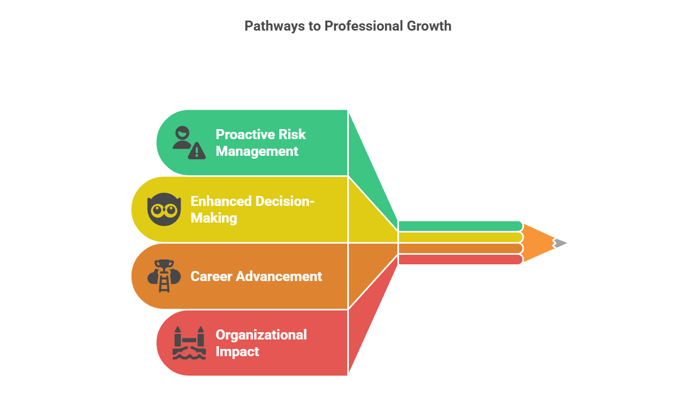
Proactive Risk Management: Learn to anticipate and address potential project pitfalls before they become issues.
Enhanced Decision-Making: Develop the ability to make informed decisions under uncertainty.
Career Advancement: Stand out in the job market with a credential that showcases your risk management expertise.
Organizational Impact: Contribute to your organization's resilience and adaptability in a volatile business environment.
📊 CPRM vs. Other Project Management Certifications
Certification | Focus Area | Ideal For | Duration | Cost |
CPRM | Risk Management | Professionals focusing on risk | 3-5 days | $1,500 |
PMP | General Project Management | Experienced project managers | Varies | $405-$555 |
APMIC | Industry-Specific Modules | Beginners to advanced professionals | Flexible | Varies |
Note: Costs and durations are approximate and may vary based on the provider.
🧩 Key Components of the CPRM Curriculum
Risk Identification: Techniques to uncover potential project risks.
Risk Analysis: Quantitative and qualitative methods to assess risk impact.
Risk Response Planning: Strategies to mitigate or capitalize on risks.
Monitoring and Control: Tools to track and manage risks throughout the project lifecycle.
🔍 Who Should Get the CPRM Certification?
Not every hero wears a cape — some carry a risk register! 😎 The Certified Project Risk Manager (CPRM) Certification is tailor-made for professionals looking to lead and mitigate risk in high-stakes environments. Wondering if it's your jam? Here's who should seriously consider the CPRM:
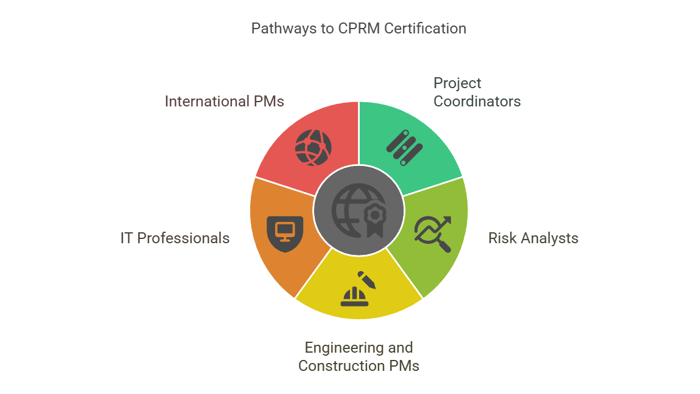
🎯 Project Coordinators aspiring to step into leadership roles
🧠 Risk Analysts looking to specialize and move into strategic project roles
👰 Engineering and Construction PMs handling complex, high-budget infrastructure projects
💻 IT Professionals managing software or cybersecurity risk projects
🌐 International PMs involved in global operations and compliance
"CPRM isn’t just a title — it’s a mindset. If you see risk as an opportunity, not a threat, you belong here."
Pro Tip: If your role involves risk-heavy decision-making and stakeholder communication, CPRM could become your career catalyst. 🚀
🌎 Global Recognition of CPRM: Country-Wise Accreditation Guide
In today’s borderless world, your certification needs to travel with you, and CPRM does just that. 🌍 Here’s a handy table of where CPRM is widely recognized and highly respected:
Country | Recognition Status | Additional Notes |
🇺🇸 USA | Widely Recognized | Especially in tech and finance |
🇬🇧 UK | Highly Preferred | Strong demand in construction & IT |
🇨🇦 Canada | Recognized by employers | Seen in enterprise project roles |
🇦🇺 Australia | Gaining traction | Popular in mining & public sector |
🇦🇪 UAE | Employer-valued | Essential for mega-infrastructure |
Bonus Read: Check how CPRM stacks up in your country’s job market — you might be surprised at its global reach. ✈️
📈 Job Roles and Salaries After CPRM Certification
Curious what a CPRM can actually earn you? 💰 Here's a breakdown of average annual salaries in major markets, based on job roles:
Job Title | USA | UK | Canada | UAE |
Project Risk Manager | $115,000 | £78,000 | CA$102,000 | AED 300,000 |
Senior Project Manager | $130,000 | £85,000 | CA$112,000 | AED 330,000 |
Risk Analyst | $95,000 | £60,000 | CA$90,000 | AED 270,000 |
"CPRM certification is like planting seeds in a career orchard — the fruits are long-term roles and leadership gigs."
Pro Tip: Positions in defense, oil & gas, or regulated industries offer premium salaries for CPRM holders. 💼
🧠 10 Lesser-Known Facts About Project Risk Management
Risk Management is a Continuous Process: It's not a one-time task but an ongoing activity throughout the project.
Positive Risks Exist: Also known as opportunities, positive risks can lead to beneficial outcomes.
Risk Appetite Varies: Organizations have different thresholds for risk tolerance.
Cultural Factors Influence Risk Perception: Cultural backgrounds can affect how risks are viewed and managed.
Risk Management Enhances Stakeholder Confidence: Proactive risk strategies can build trust among stakeholders.
Risk Registers are Living Documents: They should be updated regularly as new risks emerge.
Communication is Key: Effective risk management relies on clear and consistent communication.
Risk Management Supports Innovation: By managing uncertainties, organizations can pursue innovative projects more confidently.
Risk Management is Integral to Agile Methodologies: Agile frameworks incorporate risk management into their iterative processes.
Technology Aids Risk Management: Tools and software can enhance risk identification and analysis.
💡 Pro Tips for Aspiring CPRMs
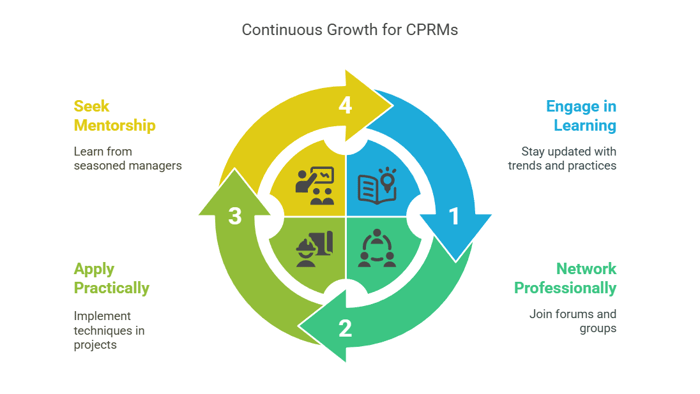
Engage in Continuous Learning: Stay updated with the latest risk management trends and practices.
Network with Professionals: Join forums and groups to exchange knowledge and experiences.
Apply Learnings Practically: Implement risk management techniques in real projects to gain hands-on experience.
Seek Mentorship: Learn from seasoned risk managers to navigate complex scenarios.
Not sure where to start? You might want to check out the easiest certification options before diving into a more specialized one like CPRM.
📚 Bonus Read: Enhance Your Knowledge
For a comprehensive understanding of project risk management, consider exploring the Project Risk Management Handbook. This resource offers in-depth insights into risk management processes and best practices.
💬 Quotes to Inspire Your Risk Management Journey
"Risk comes from not knowing what you're doing." – Warren Buffett
"The biggest risk is not taking any risk." – Mark Zuckerberg
🎯 Final Thoughts: Elevate Your Career with APMIC
If you're seeking a certification that not only covers risk management but also offers a holistic approach to project management, consider exploring APMIC's project management certifications. With a vast array of modules and flexible learning options, APMIC equips you with the skills to excel in today's dynamic project environments.
Embark on your journey to becoming a Certified Project Risk Manager today and transform the way you approach project uncertainties! 🌟
FAQs
What is the eligibility criteria for the CPRM certification?
Eligibility varies by provider, but generally, candidates should have a background in project management and some experience in risk-related roles. Some programs may require prior certifications or training.
How does CPRM differ from PMP?
While PMP covers a broad range of project management topics, CPRM focuses specifically on risk management, providing deeper insights into identifying and mitigating project risks.
Can I pursue CPRM certification online?
Yes, many institutions offer online CPRM courses, allowing flexibility for working professionals.
What industries benefit most from CPRM certification?
Industries like construction, IT, finance, and healthcare, where projects are complex and risk-prone, can greatly benefit from CPRM-certified professionals.
How long does it take to complete the CPRM certification?
The duration varies but typically ranges from 3 to 5 days for intensive courses
Is CPRM recognized internationally?
Recognition depends on the certifying body. It's essential to choose a reputable institution whose certifications are acknowledged globally.
What is the cost of CPRM certification?
Costs vary by provider but generally range around $1,500.
How does APMIC's certification compare to CPRM?
APMIC offers a comprehensive program with over 400 modules, covering various aspects of project management, including risk. It's ideal for those seeking a broader certification with industry-specific modules.

